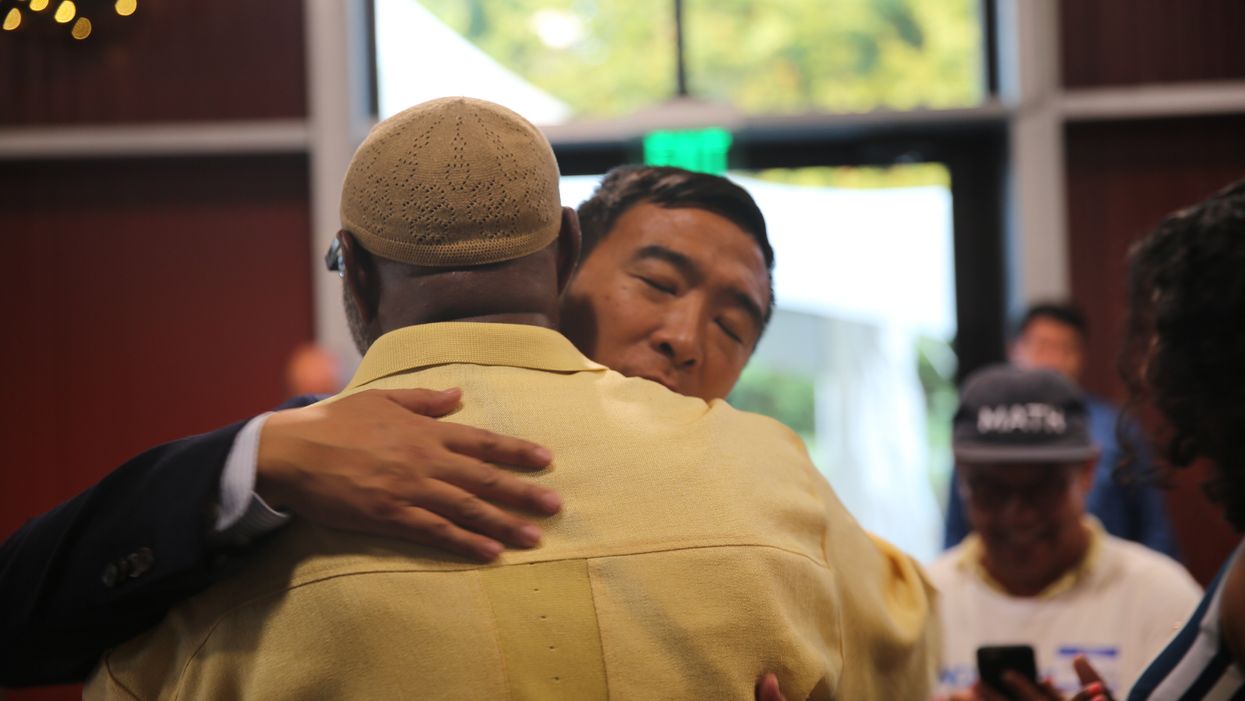
Photo by Sean Ryan

Jasper Winery was all glass and concrete and metal, so every sound made an echo. But the room was too narrow to accommodate light rigs and spotlights, and it had air conditioning, at least.
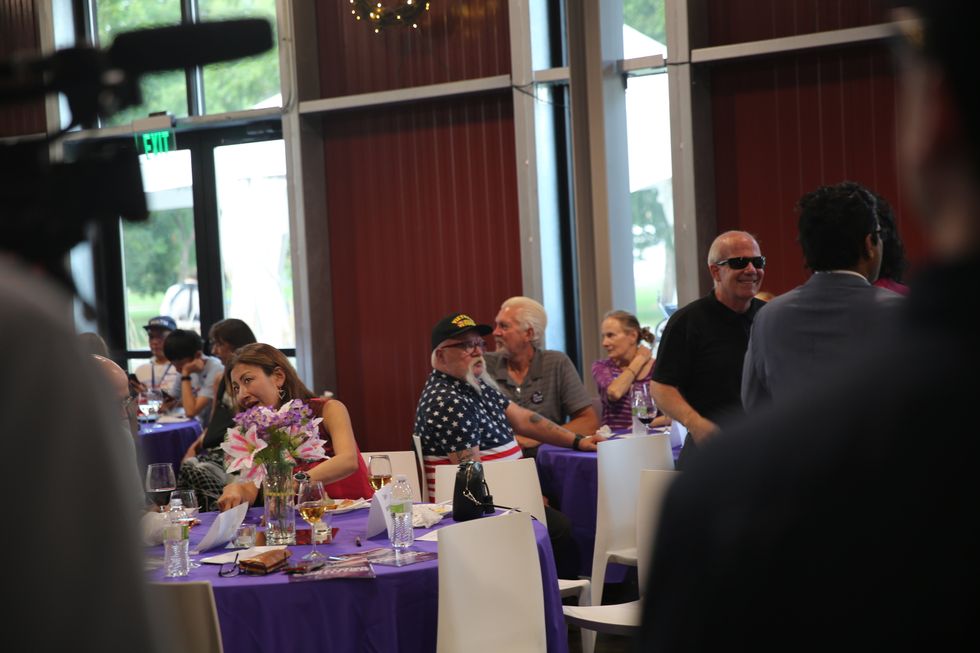
A crimson velvet rope divided the stage from the audience, a matching red carpet lined the puny little stage, and an expressionless man pushed the knobs of a soundboard, five feet from the microphone, ambushed by foliage behind the curtain-wall glass window.
As soon as Democratic presidential candidate Andrew Yang arrived, he was out among the people. A Saturday in Des Moines, Iowa
Earlier that day, in the press room at the Presidential Gun Sense Forum, he shrugged off the usual questions and had fun, even made himself laugh several times as he ragged on Donald Trump.
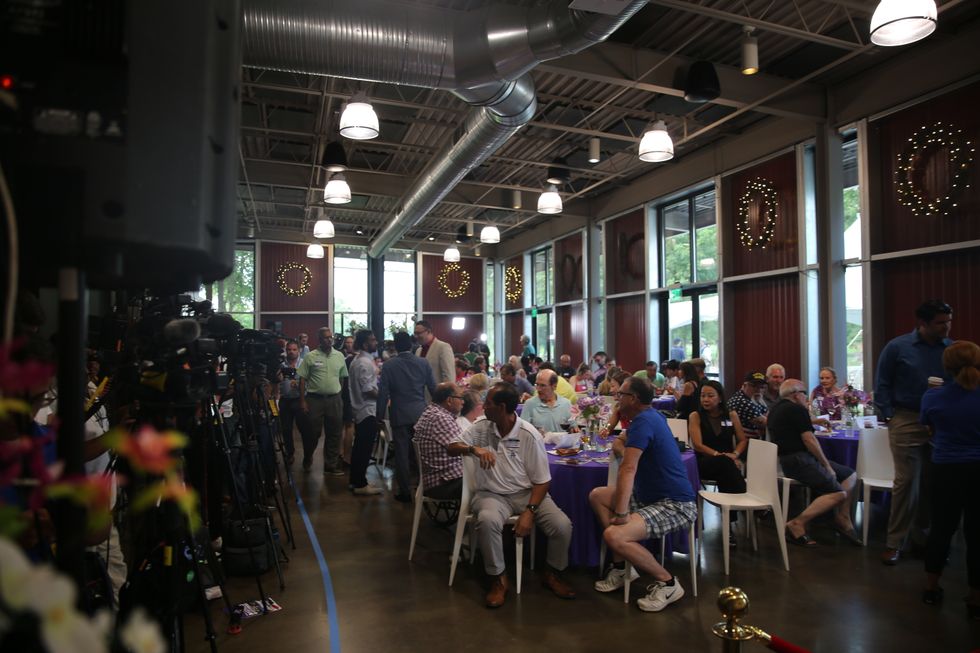
It was silly, the way he did it. Playful. Innocent.
At one point, he struck a pose, saying, "I'd challenge Donald Trump to any physical or mental feat under the sun," with a mischievous grin. "I mean, gosh, what could that guy beat me at, being a slob?"
You can just picture Yang's staff, trying to lock eyes with him, giving hand signals, lipping "That's enough, Andrew."
Yang, 44, didn't care. He did not care. He was having fun with it.
"Like, something that involved trying to keep something on the ground and having really large body mass? Like, if there was a hot-air balloon that was rising and you needed to try and keep it on the ground, he would be better than me at that," he paused in thought. "Because he is so fat."
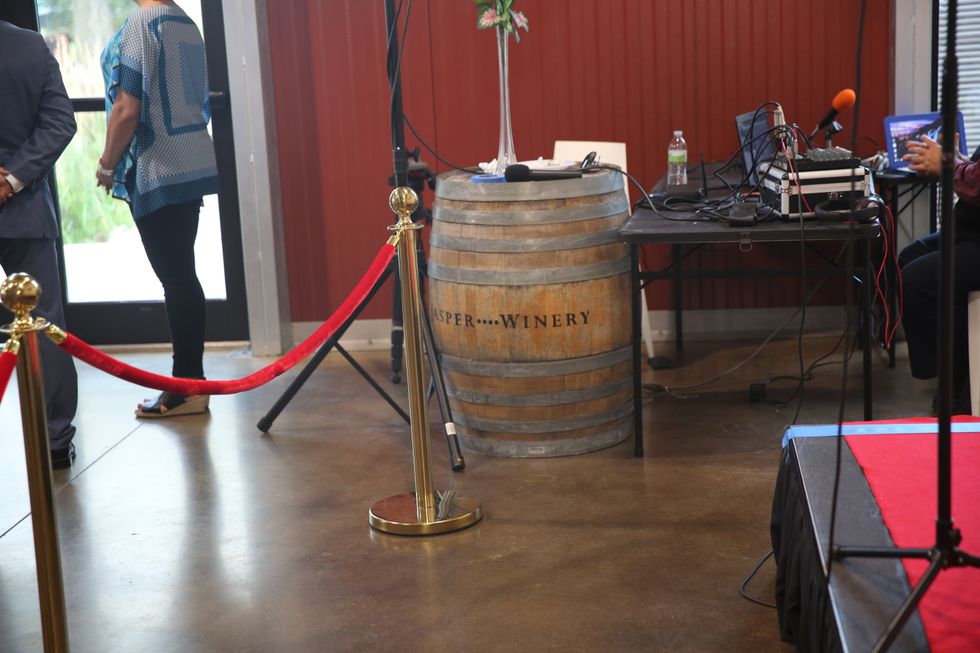
A few outlets labeled it fat-shaming. And The Atlantic saw it as another example of Yang's novelty pessimism.
But in Iowa and online, people kept saying "Yang has a good heart." That, in person, he just lets off a calmative energy, a kindness.
He does.
Twenty minutes before his "Trump is fat" comments, Yang gave a speech about gun control as part of the Presidential Gun Sense Forum, and during the Q&A, a woman told him about her 4-year-old daughter. How she was struck by a stray bullet. Died two days later. The girl's twin brother saw it happen.
The whole time the woman talked, Yang limply covered his face.
"Can I give you a hug," Yang asked. "Would that be appropriate?"
He jogged over to the woman, hugged her, said a few quiet words.
His face kept a sunken look, all brutal devastation. He needed to burst into tears.
"I have a 6- and 3-year-old boy," said Yang, then he made a tiny whimper and sank his face into his cupped hand, struggling for composure. Then he let go for a few moments and cried. It was the quick sob of someone who has been too busy to deal with too many things.
"I was imagining it was one of them that got shot and the other saw it," he said. "I'm so sorry."
Yang broke into tears again. Covered his eyes with his hand. The audience clapped. Yang shuffled himself onto the stage.
He bristled himself back, as much as he could, looked out at the crowd, and gave his translation. His why not?
"The biggest downside of running for President, for me, is that I don't get to see my family very much," he said. "So I get pictures. I FaceTime, I see pictures of my boys and, just that scene that she described, I'm sorry, it's just very, very affecting."
Then he straightened his posture, focused his stare, and answered the woman's question.
*
Yang occasionally hugs with his head leaning right. Among yoga therapists, this is called a heart-to-heart hug, or a connecting hug. It opens the heart chakra, the spiritual energy center that contains love and compassion.
Research on hugging says otherwise. A study in the International Journal of Psychophysiology determined that most of the time we prefer right-side hugs, and that left-sided hugs are in fact the signals of true emotion.
Researchers in Germany found that "When people hug, emotional and motor networks in the brain interact and cause a stronger drift to the left in emotional contexts."
They found that people in emotionally neutral situations hugged right 92 percent of the time, while people in emotionally charged situations hugged right 83 percent of the time.
Body language expert Dr. Lillian Glass disagrees with the implied conclusion.
"When you hug someone, there's a great deal of various emotions that are involved. Most people are statistically right-handed, so you're going to go to the right side."
*
At Jasper Winery, Yang stood near the back of the crowd. People seated at tables draped with violet cloth and people standing or leaning against the tall, wide windows along the slink building.
To their right, crowded in a narrow line that blocked the bathrooms, journalists trained their eyes and cameras on Sen. Kamala Harris as she appeared from a backroom at the side of the stage then fiddled the microphone loose.
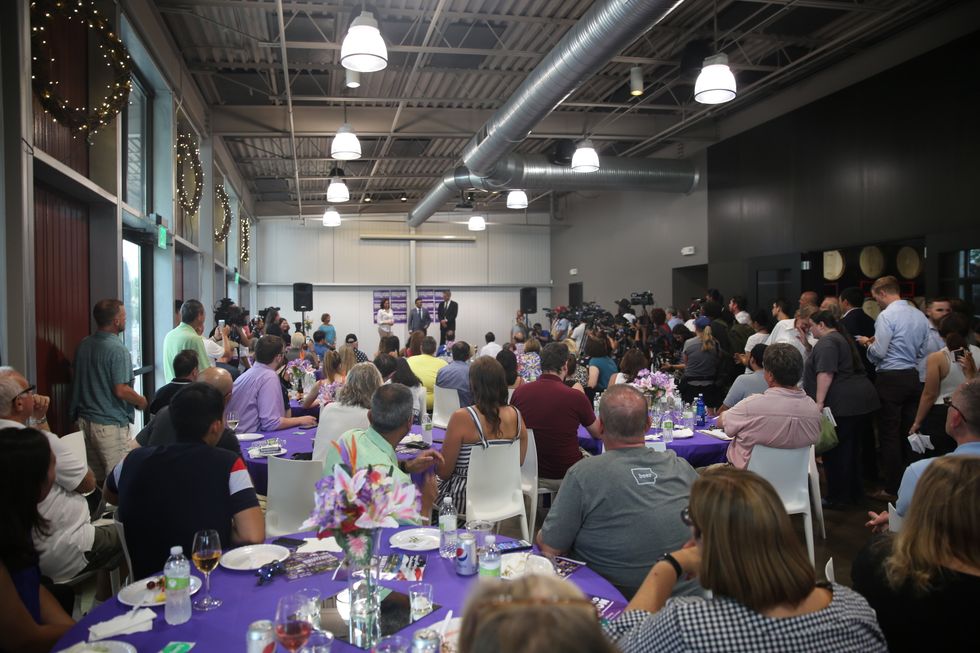
The event was hosted by the Asian & Latino Coalition, the same organization that had held the Joe Biden speech at the plumbers union, when he compared "poor kids" to "white kids."
Harris' bus was just outside the door next to the stage. The winery had giant windows along all the walls, so no matter where you were in the room, you could see the back of Harris' bus, "TEXT IOWA TO 70785."
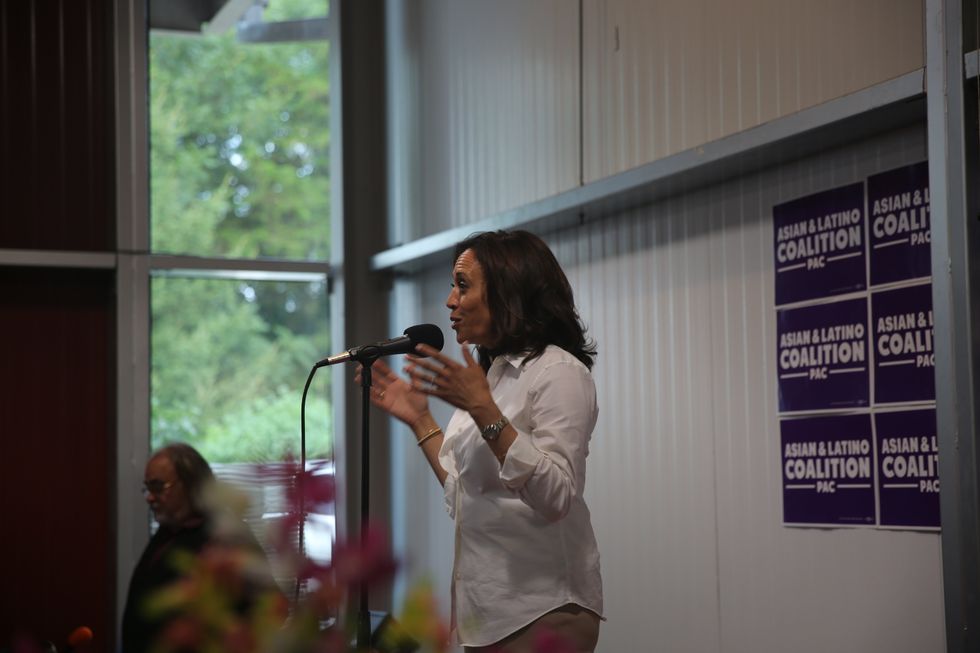
"My mother always told me, 'Be the first to do many things. But don't be the last.'"
People clapped, and Harris noted their applause. The line worked. Again. As always. In part because Harris has lived it out. The first but never the last. Nearly every office she has been elected to, she's the first black woman. She's the second black woman elected to the Senate, but the first of South Asian descent.
She wore the same white shirt and tan pants as at the two appearances we'd been to earlier that day, and matching tan heels.
"Who are we?" she asked.
"We are fighters," she answered.
Fighting. A theme in her life and her speeches.
That night's word was "aspirational."
At the end of her speech, the room tore into a cascade of applause, and Harris smiled like politicians do, like fishermen when they hook a monster.
*
As the crowd settled, the Asian & Latino Coalition president took the stage beside Harris. After some jocular banter, he handed her an envelope, donations of some kind, or maybe a letter — the guy was hard to understand — and would she symbolically place it in this wicker basket?
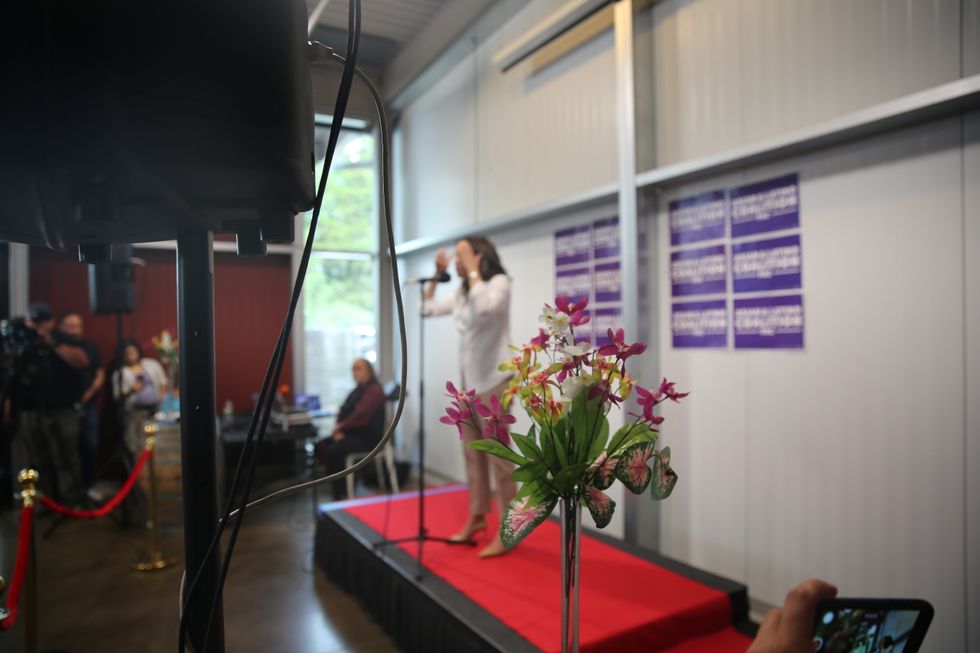
"I can't give nobody a closed envelope," she said, laughing. Then, for good measure, forcing more laughter, "Momma didn't raise no fool."
Yang chuckled. He stayed in the crowd for Harris' entire speech. Anytime someone came up to him, he whispered, nodded, then re-trained his focus to Harris onstage. At this point, there was mutual respect.
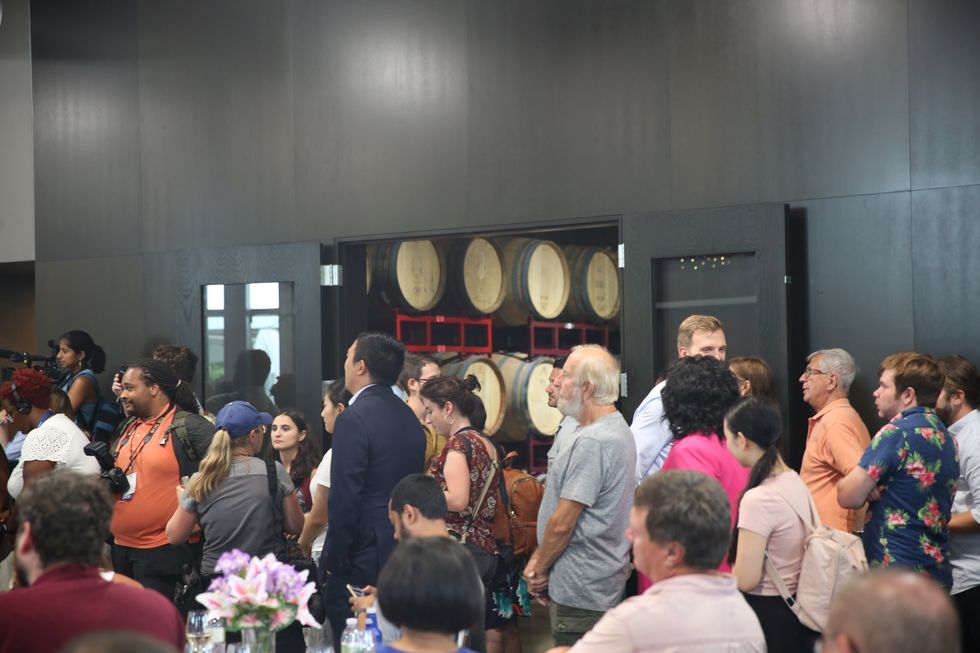
A month later, in Houston, in the Spin Room of the third Democratic Debate, Harris and Yang would completely ignore one another. And how many times would the following events cross their minds at night?
*
Harris lowered into a seat near the front, and waited, with her legs uncrossed and her hands clasped by her knees. It was a Michael Jordan pose. A Frank Sinatra posture. Yang was next. People kept slouching over to Harris, whispering because the ALC president was introducing Yang. Harris watched. She listened. She nodded. She smiled, when it was called for. Laughed, when it was called for. Clapped. Nodded.
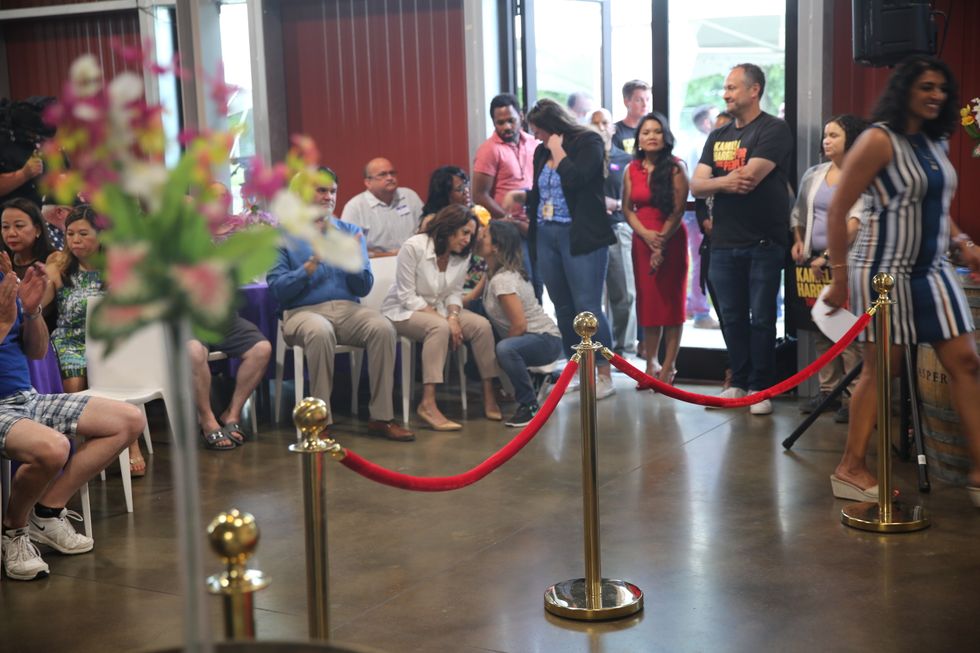
The ALC president made some kind of in-joke with Yang, and Yang pointed back like he was the coolest kid at the party, and he's about to do a keg stand, smirking with his lips pursed. Because Yang has the body posture and mannerisms of a savvy New York rapper.
Like everyone else, the ALC president had only praise for Yang. The ALC president, God bless him, was near impossible to understand. He spoke quick, with a bobbing cadence.
"All time I see him, he ask, 'How your son doing?' We share in common, me and Andrew, that my son has autism, he is 16 years old, and I know your son does too. We share a lot about that pain. And," pointing to Yang, "there's a good heart there."
*
Slowing down for a moment, he said, "Life is not easy," then something else, then commended Yang's plan for universal basic income, $1,000 a month for free, no questions asked.
Because it won't be long before automation has left us jobless in a "Blade Runner" dystopia.
Yang smiled and nodded, the head bob of someone listening to Wu-Tang Clan on massive headphones as they slouch on the subway, careening toward nowhere, young in Manhattan.
"He is a serious candidate," said the ALC president, to applause and a few hoots.
Elon Musk had endorsed Yang earlier that day. Elon Musk. The guy who — cosmically speaking — makes up for just about every worthless jackass you know. The guy who shot a Tesla — cars of the future, by the company he created — into space as a symbol of his growing accomplishments. Elon Musk.
"So without further ado…"
Yang wove through the narrow room and took the stage like it was a familiar blanket. Right away, he addressed Harris. She leapt up from her seat, they hugged. Harris initiated, head to the left. She often closes her eyes when she hugs. Yang, too. This time Harris kept her eyes open.
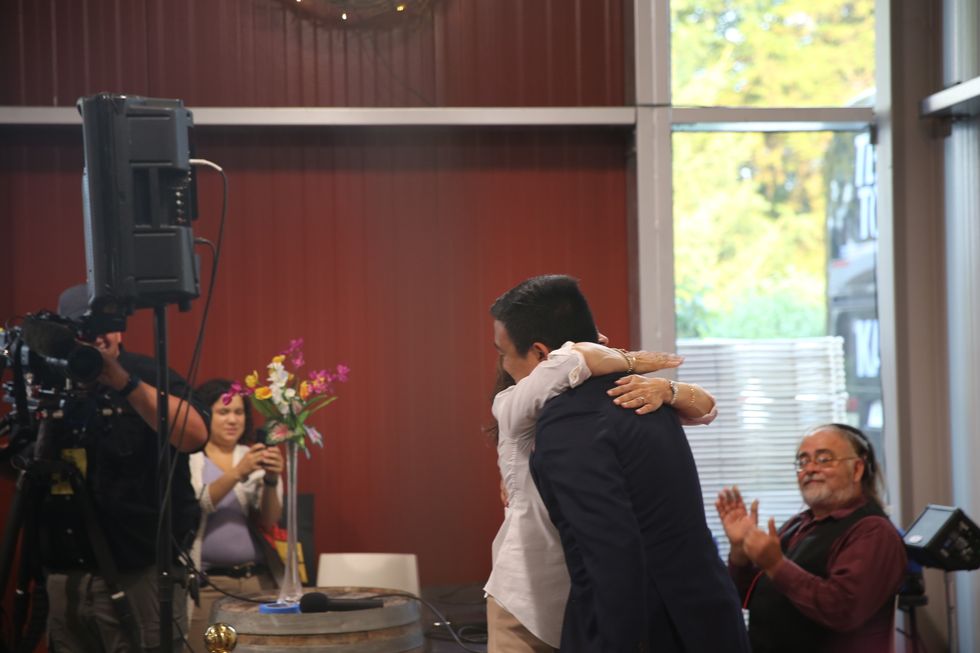
*
"Kamala," said Yang, gripping the microphone with three fingers on his left hand, "it is so much better to speak before you than after you."
Two minutes into Yang's speech, Harris left.
Jasper Winery has 3 exits. She chose the one next to the sound guy, so everybody who followed her had to walk in front of the stage.
And she took half the place with her. More, maybe. Half of the audience. And since most of the media were there for her speech, most of them followed. Loudly. They were breaking down camera rigs and shuffling, all as Andrew Yang spoke.
And every time someone opened the door, all you could hear was the "BRRRRRRRKKKKKKRRRRRKKKKPOPKK" of the KAMALA bus's engine.
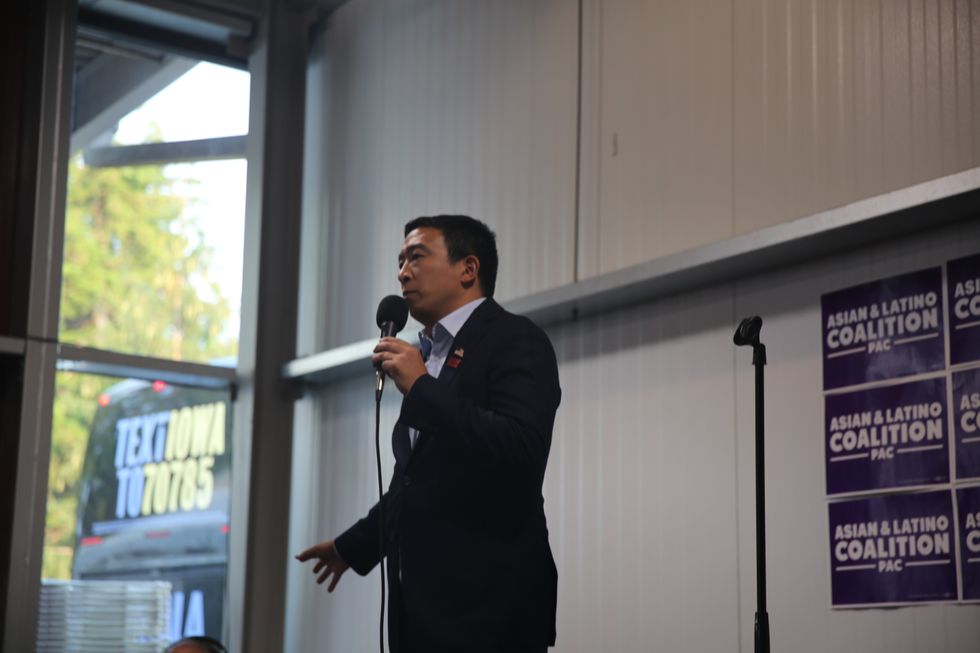
There were so many people leaving that someone just propped the door open, and nobody bothered to close it, so someone else eventually shuffled over and yanked it hard shut.
Yang kept talking, in his Maya blue button-up and navy blue suit with an American flag on the left lapel, without a tie, as usual. Chairs squeaked, tables shifted, people spoke to one another, shuffling in line out the door.
"I'm running to solve what I believe is the biggest problem of our time," he paused for a moment and stared at passersby. "Enjoy the bus." The people who were listening laughed.
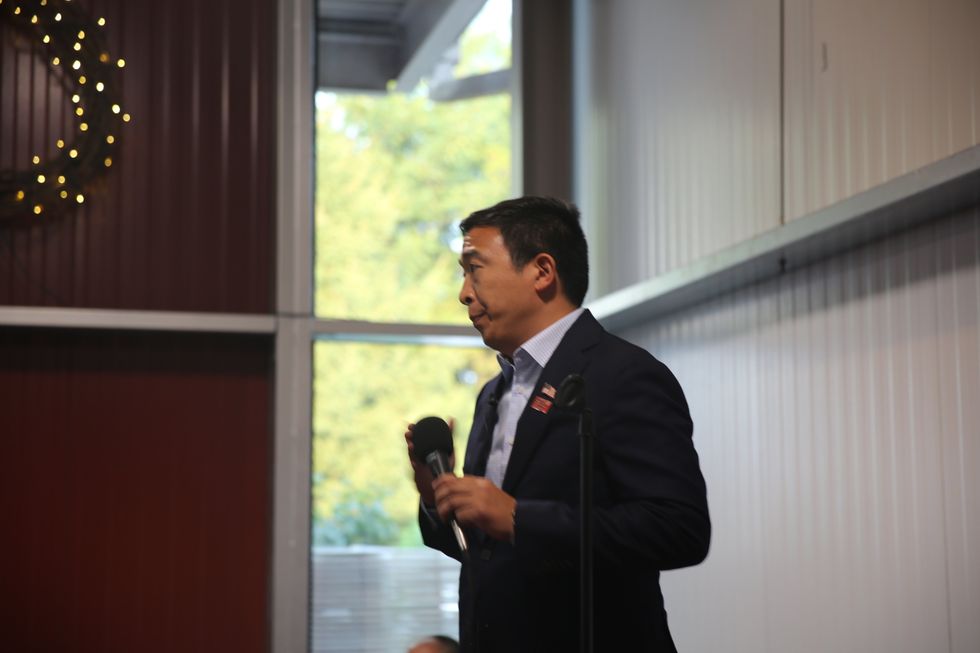
"And the problem is, how did Donald Trump win Iowa by 9 points in 2016? How did he win in Michigan, Ohio, Pennsylvania, and Wisconsin? Now if you turn on cable news, you might get a series of explanations. What are the factors they're giving? Russia, racism, Facebook, the FBI, Hillary Clinton. Those are probably the factors that get cited. But I've done the numbers and found an explanation that I believe drives more of the election outcome than we talk about ever, and it's the fact that we gave away four million manufacturing jobs in Michigan, Ohio, Pennsylvania, Wisconsin, and 40,000 right here in Iowa."
He stared forward in his rubber-sole black shoes.
He loved to get a show of hands, but he often went on with his point before people had a chance to lift them. Maybe the greater point was, "I already know the answer."
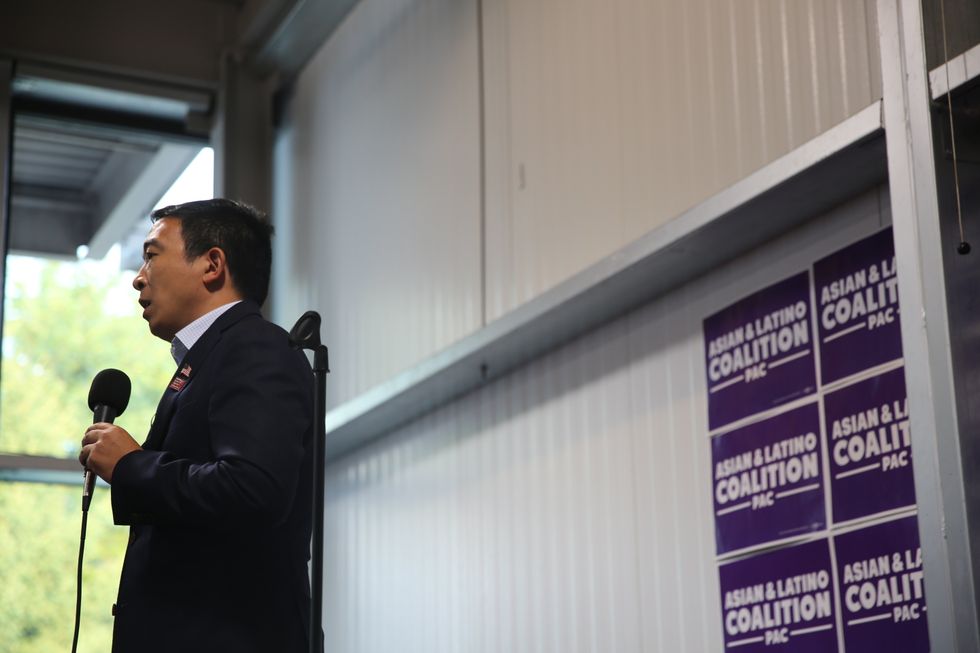
Then he shifted into one of his biggest ideas. Automation. He was the only candidate talking about it. Which was terrifying. They ought to all have a plan.
He filed to run for president a solid year-and-a-half before any of the other Democrats, on Nov. 6, 2017. But still after Trump, who filed on his first day in office.
*
The day before, Yang had walked around the Iowa State Fair with a turkey leg and a giant grin like he didn't give a damn. By all accounts he did not, does not.
"How many of you have noticed stores closing around where you live, here in Iowa?" Many of the people in the audience raised their hands. He asked them did they know why.
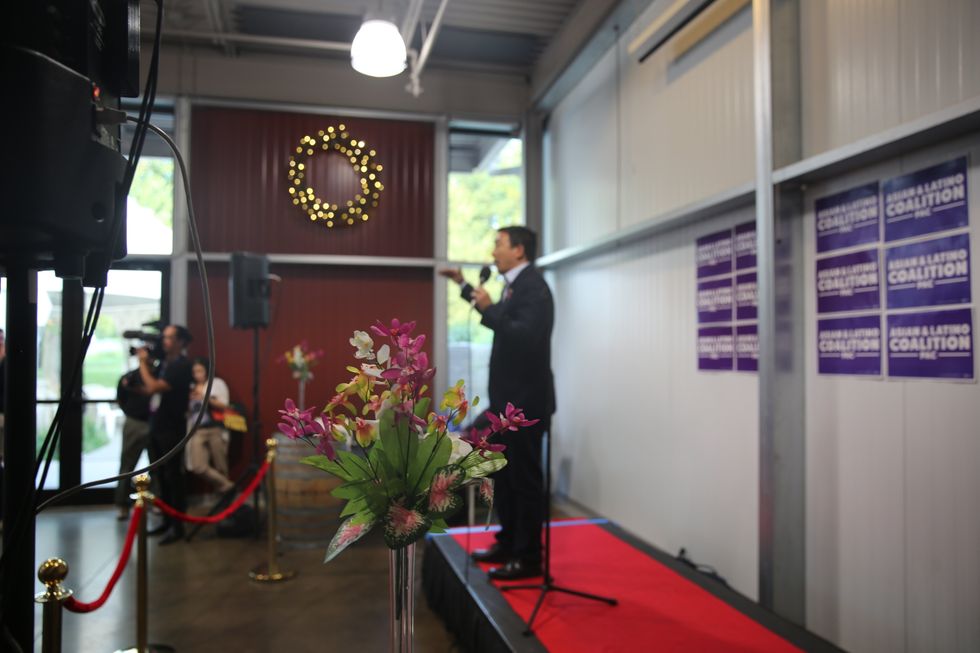
In unison, they said, "Amazon."
"That's right," he replied. "Amazon's like a blackhole sucking 20 billion dollars in business every single year. It's closing 30 percent of your stores and malls."
He paused.
"How much is Amazon paying in taxes," he asked.
They said, "zero" in unison like they were at an early Mass.
"Zero," he said. "That is the math, Iowa."
"How many of you have visited Iowa 80, the country's largest truck stop in Davenport?"
Nearly every hand in the room snaked up, toward the exposed rafters.
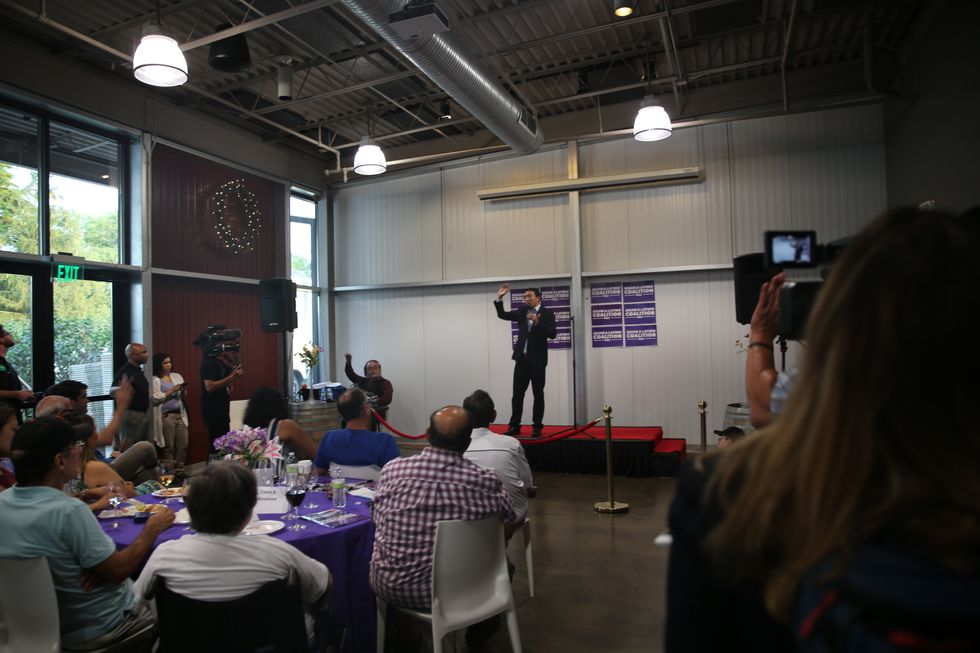
"They proudly say that 5,000 people stop there every single day. My friends in California are working on trucks that can drive themselves. They're working on those self-driving trucks because of all the money involved. $168 billion a year in savings if they can succeed in automating away truck drivers. How many people will stop at Iowa 80 when the trucks have robot drivers that don't need to stop for a meal? What's that going to mean here in Iowa, where truck driving is the most common job in the state? And not just here in Iowa, but 28 other states."
"We're in the midst of the greatest economic transformation in the history of our country," he said, and the room got quiet. The fourth industrial revolution. Of the other candidates, only Biden had discussed it, and with a cursory grasp.
"This is no longer science fiction," Yang said. "This is reality in 2019. This is why Donald Trump is our president today."
The Kamala tour bus chugged and belched just outside the door.
"The reason why I am here is because you hold the future of the country in your hands, here in Iowa," he said. "You're a bit spoiled, Kamala just left and I am here, Amy [Klobuchar] is coming in, and there's this constant parade of presidential candidates, and why? Because we know that you control the fate of the country."
Harris was rounding the corner outside, her entourage barking out questions behind her, but everyone in the room trained their eyes on Yang.
"Do you know how many Californians each Iowan is worth? One thousand! You look around this room and there may be 160 people in this room. I see a group of 160,000 Californians."
Oh now the audience loved that. They clapped and cheered for a solid 15 seconds.
"It's a good thing Kamala just left because she probably wouldn't like that," to which they laughed, as Yang gave off a charming smile.
The Harris gaggle crawled forward then stopped right outside the giant windows at the middle of the audience. Another couple of journalists folded out of the room. Another handful of onlookers followed. Harris faced Yang without looking at Yang, as if she were reminding everyone that she, her entourage, the media, and all those other devoted people were the real star. It felt like a lion stalking a lone zebra at the watering hole.
But Yang didn't care, waiting for the ice cream truck on a mild summer day.
*Yang repudiated claims that his $1,000-a-month stance on Universal Basic Income was a mere gimmick. He called it a deeply American idea that's been with us since our founding.
"Martin Luther King Jr. championed it on the very day he was assassinated."
He asked a question and they answered.
Asked another question, they answered.
Another, answered.
"That's right," he said. "Thank you, Iowa."
Somebody whooped at the teamwork.
He told them that his wife was at home with their boys. "What is her work included at, in GDP every year?"
One woman, "zero."
"What is the market value of her work at?" Nobody answered, not quickly enough, so Yang said, "Zero. And we know that that's nonsense. We know that her work is some of the most challenging and vital that anyone is doing. How many of you are parents, raise your hands?"
Most of the room.
"When I'm at home with my kids for a day or two and my wife leaves, you know what I say? I say, 'Get me back to running for president as soon as possible.' Because being a parent is the hardest work there is."
*"BRRRRRRRKKKKKKRRRRRKKKKPOP" of the KAMALA bus engine.
"Thanks to you in Iowa I just qualified for the fall debates," he said.
And for a moment, their applause was the loudest noise in the area.
He did something none of the other candidates had even hinted at trying. He appealed to Trump supporters.
"I am only one of two candidates that 10 percent or more of Trump voters said they would vote for. I am a younger, fresher, more modern, more Asian version of Bernie."
Laughter and applause.
"BRRRRRRRKKKKKKRRRRRKKKKPOP."
"The Democratic Party talks about empowering women," he said. "I'm talking about actually recognizing what women are doing right now."
"Woot!" and applause.
"BRRRRRRRKKKKKKRRRRRKKKKPOP."
"The opposite of Donald Trump is an Asian man who likes math."
"BRRRRRRRKKKKKKRRRRRKKKKPOP."
*
Meanwhile, Harris pressed closer to the glass outside, and everyone inside was prey in an incubator.
In 1994, Harris started dating then-Assembly Speaker Willie Brown, a married man 30 years her senior. Brown was 60, four years older than Harris' father. The relationship has proven to be a thorn in Harris' side. Now she's happily married to Doug Emhoff, an entertainment lawyer, but that doesn't stop the accusations of career-motivated dalliances.
Brown was politically connected, so Harris became politically connected.
He appointed Harris to positions that paid well, about $100,000 a year. He gave her a BMW. Then he was elected mayor of San Francisco. Harris celebrated his win, but ended the relationship before Brown was inaugurated.
She turned on him.
In an interview, Harris described Brown as an "albatross hanging around my neck," adding, "I have no doubt that I am independent of him –– and that he would probably right now express some fright about the fact that he cannot control me. His career is over; I will be alive and kicking for the next 40 years. I do not owe him a thing."
In January 2019, Brown, who was known for his lavish outfits and extramarital gamesmanship and who had a minor role in "The Godfather: Part III," penned a letter for the San Francisco Chronicle, "Sure, I dated Kamala Harris. So what?"
Brown concluded the letter, "Yes, I may have influenced her career by appointing her to two state commissions when I was Assembly speaker. And I certainly helped with her first race for district attorney in San Francisco. I have also helped the careers of House Speaker Nancy Pelosi, Gov. Gavin Newsom, Sen. Dianne Feinstein and a host of other politicians. The difference is that Harris is the only one who, after I helped her, sent word that I would be indicted if I 'so much as jaywalked' while she was D.A. That's politics for ya."
In a recent profile by The Atlantic, Yang said, "If you're a politician, your incentives are to make with the happy talk and then get elected — and then solving the problems is secondary, because you have to raise money to try and get re-elected, but no one ever back-checks you. The incentives are to say, 'We can do this; we can do that. We can do the other thing.' And then, meanwhile, society falls apart."
*
After his speech, Yang clobber-stepped off the front of the stage, unconcerned with the protocol of stairs and formal exits.
People had surrounded him by the time he'd taken a few steps.
He leaned in to hear a man in an American-flag short-sleeve button up. The shadow of the man's "Vietnam Veteran" hat covered his eyes, and maybe he was crying a little as he told his story. He had the most impressive handlebar mustache I had ever seen. I will likely never see a mustache of its promontory.
Yang listened with an unforced calm.
Everyone drew closer. Yang had suction energy like Biden, Harris, and Sanders, but in a much different way. His was inviting. Something you could share.
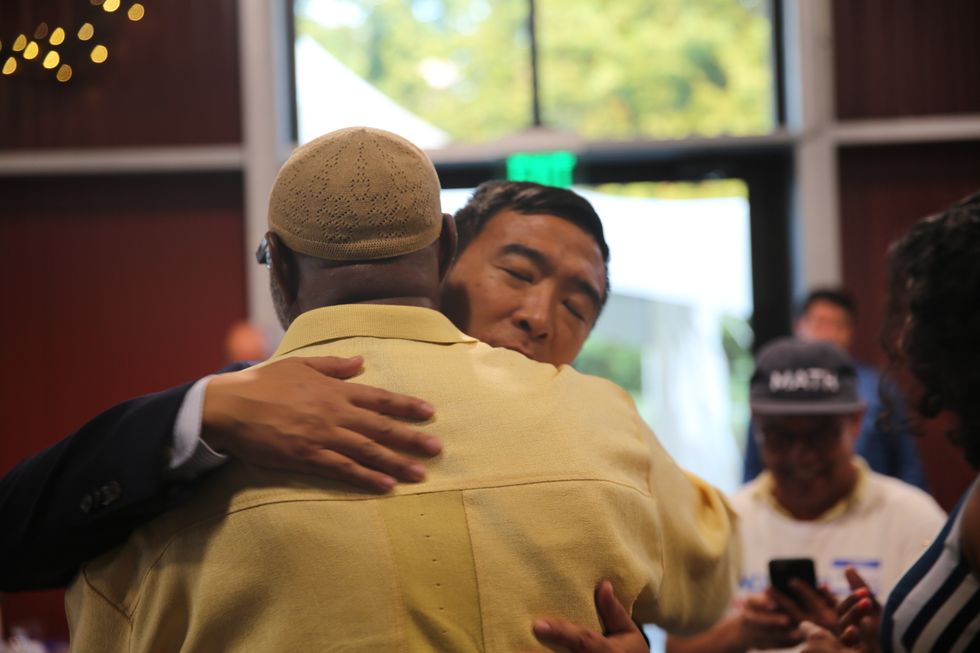
On his left, a man in a beige flat cap and a T-shirt with the globe on it and the words, "No pipeline! Keep our fields green and water clean."
Harris passed by the giant windows one more time. You could hear the journalists shouting questions as they walked sideways or backward, whatever got them as close as possible. Twenty journalists crabbing around her. Thirty, maybe. People with questions. They looked like a bunch of ants carrying an orange slice back to the colony, because, yes, the queen would be proud.
Harris had to nudge to get to her tour bus. Something about it, like she enjoyed the nudging, never nudged hard enough to leave in a hurry. As if she could only take a few small steps at a time, like a climber near the summit of Everest.
Her staff herded the giant knot of people and cameras, all with a concerned look to their faces as they guided Harris onto the KAMALA bus.
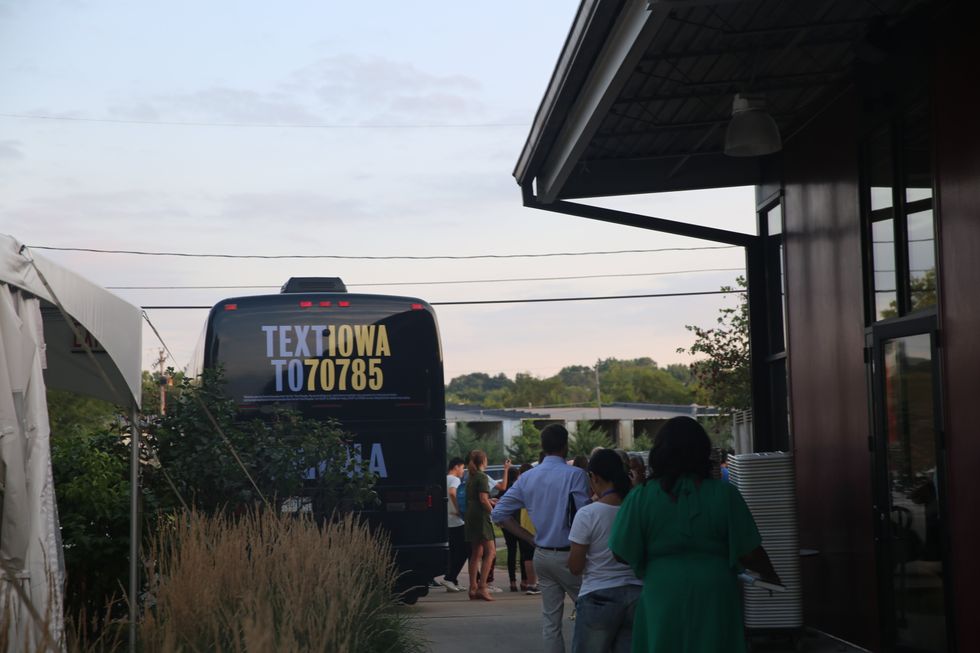
Amy Klobuchar was about to take the stage. Nobody seemed to notice or care.
A dozen or so people lingered at the side of the bus. Two older men slumped into folding chairs that were comically out-of-place, mere feet from a dumpster. One of the men, the bigger sloucher in his dirty gray shirt and ropey sandals, held his right hand up toward the bus's tinted window as the bus nudged forward.
One of the organizers from the Asian and Latino Coalition smiled at the bus, then turned to me, the only media around. At first she asked if I could get her onto the bus. I shook my head "No" with a confused look on my face.
"Well then, will you be here Monday night, for the endorsement?" she asked. "That's when we're going to announce who we're going to endorse for president."
She added that, sure, it was a bit early to endorse a candidate, but that's what made the Asian and Latino Coalition so valuable.
Take a guess who won the endorsement?
The same person who treated Iowa like a chessboard. The same person who wore jeans and Converse All-Stars instead of slacks and heels. The same person who had that unstoppable look in her eyes, like she would never lose a fight, never stifle a tear, never quit charging.
The bus chugged off into the lamplit evening, and the crowd of gawkers mostly dispersed.
But the slouching man in the gray shirt still had his hand up, jutting into the air. I'd forgotten about that guy. For a moment I was afraid he'd entered some catatonic state.
His hand pointed up like a flag pole that hadn't held a flag in years.
Eventually, he lowered his arm and went back to staring at the empty field across the street.
With the bus gone, a sudden quiet overtook the air. You could hear all the tiny noises that had been drowned out by the shaking chug of the engine. Over our heads, some birds sang and danced like they knew gymnastics. Locusts, wherever they were, chaffed their own asses.
"You think she saw me?" asked the slouching man.
"I don't know," said the other, "those windows were pretty well tinted."
New installments of this series on the 2020 elections come out every Monday and Thursday morning. Check out my Twitter. Email me at kryan@mercurystudios.com